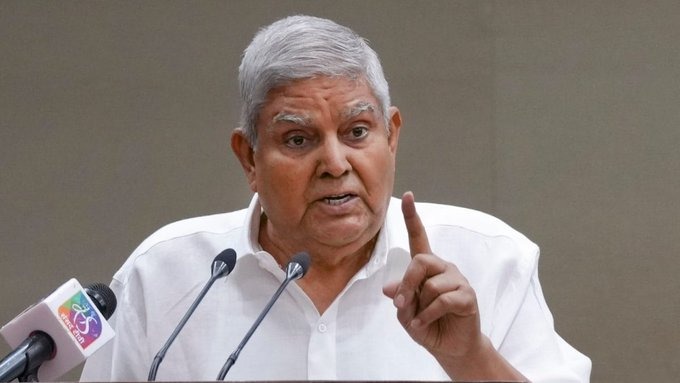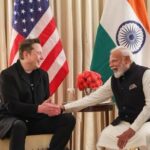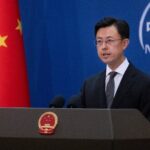April 18, 2025
In a remarkable exchange that has intensified the ongoing debate about separation of powers in India’s constitutional framework, Rajya Sabha Chairman Jagdeep Dhankhar’s comments about judicial overreach prompted sharp criticism from veteran lawyer and parliamentarian Kapil Sibal. The controversy comes at a time when relations between the judiciary and legislature in India appear increasingly strained, raising questions about the delicate balance of power between constitutional institutions.
The Controversial Remarks
On April 17, Vice President Jagdeep Dhankhar, who serves as Rajya Sabha Chairman, made pointed remarks questioning the judiciary’s authority to set timelines for presidential decisions. Speaking at a public forum, Dhankhar characterized certain judicial actions as an attempt to function as a “super Parliament,” and dramatically stated that the Supreme Court cannot fire a “nuclear missile” at democratic forces.
“When the judiciary sets timelines for the President of India to make decisions, it oversteps its constitutional boundaries,” Dhankhar reportedly said. “The judiciary cannot act as a super Parliament. The Supreme Court, with all due respect, cannot fire a nuclear missile at democratic forces.”
The comments appeared to reference recent Supreme Court decisions that set deadlines for gubernatorial actions on legislation and appointments, which some government supporters have characterized as judicial overreach.
Sibal’s Swift Response
Kapil Sibal, a former Union Minister and senior advocate who now sits as an independent member of Rajya Sabha, responded forcefully to Dhankhar’s comments. “I have never seen any Rajya Sabha chairperson make such political comments,” Sibal stated, expressing concern about what he considered the inappropriate political nature of Dhankhar’s remarks.
Sibal’s criticism highlights the unusual nature of Dhankhar’s comments coming from someone who holds the constitutional position of Vice President and Chairman of the Upper House of Parliament. As Rajya Sabha Chairman, Dhankhar is expected to maintain a position of impartiality, though his past statements have sometimes aligned closely with government positions on constitutional matters.
The Constitutional Context
To understand the significance of this exchange, one must appreciate the constitutional framework that governs the relationship between India’s institutions of democracy.
Separation of Powers
India’s constitutional architecture establishes distinct roles for the legislature, executive, and judiciary, while creating a system of checks and balances between them. The legislature makes laws, the executive implements them, and the judiciary interprets them and ensures their constitutional validity.
Professor Mahendra Singh, constitutional expert at Delhi University, explains: “The separation of powers doctrine doesn’t create watertight compartments but rather establishes a system where each branch has primary responsibility in its domain while ensuring no single branch becomes all-powerful.”
This delicate balance has often been tested throughout India’s democratic history, with periods of tension between branches typically coinciding with major political transformations or constitutional crises.
The Role of the Supreme Court
India’s Supreme Court has evolved significantly since independence, establishing itself as a powerful guardian of the Constitution through landmark judgments that have shaped the nation’s legal and political landscape.
Through judicial review, the Court has asserted its authority to strike down laws or executive actions that contravene constitutional provisions. This power, while essential to constitutional democracy, has sometimes led to accusations of judicial overreach when Court decisions appear to enter policy domains traditionally reserved for elected representatives.
Dr. Faizan Mustafa, Vice-Chancellor of NALSAR University of Law, notes: “The basic structure doctrine and the evolution of Public Interest Litigation have significantly expanded the Court’s role in governance matters. This expansion was necessitated by executive and legislative failures in certain areas but has also created tensions with other branches.”
The Position of Rajya Sabha Chairman
The Vice President of India serves as ex-officio Chairman of the Rajya Sabha, a position that carries significant prestige but also demands institutional neutrality. The Chairman presides over Rajya Sabha proceedings, ensuring fair debate and maintaining the dignity of the House.
Constitutional convention suggests that the Chairman should rise above partisan politics, particularly when making public statements about institutional relations. Previous occupants of the office have generally maintained this neutrality, making Dhankhar’s comments particularly notable.
Recent Tensions in Institutional Relations
The current controversy does not exist in isolation but represents an escalation in what observers describe as deteriorating relations between branches of government.
Judicial Appointments and NJAC
A significant flashpoint in executive-judicial relations emerged in 2015 when the Supreme Court struck down the National Judicial Appointments Commission (NJAC) Act, which would have reformed the process for appointing judges. The Court reaffirmed the collegium system, where senior judges control judicial appointments, rejecting greater executive involvement.
This decision was viewed by government supporters as the judiciary protecting its turf at the expense of democratic accountability, while defenders of the judgment saw it as essential to maintaining judicial independence.
Recent Supreme Court Decisions
Several recent Supreme Court judgments have drawn criticism from government quarters for allegedly encroaching on executive and legislative domains:
- Electoral Bonds Case: The Court’s decision to strike down the electoral bonds scheme was seen by some as judicial interference in political funding policy.
- Appointment Timelines: Judgments setting deadlines for governors to act on state legislation or appointments have been particularly controversial.
- Article 370 Judgment: While the Court upheld the abrogation of Article 370, it also directed the restoration of statehood to Jammu and Kashmir within a specific timeframe.
Such decisions have led to accusations that the Court is overstepping its interpretive role to dictate policy timelines to elected representatives.
Dhankhar’s Previous Comments on Judiciary
This is not the first time Vice President Dhankhar has expressed concerns about judicial overreach. Since assuming office in 2022, he has made several statements questioning aspects of judicial activism.
In December 2023, Dhankhar described the striking down of the NJAC Act as a “severe compromise of parliamentary sovereignty.” Earlier, in November 2022, he questioned the Supreme Court’s 2015 decision that struck down the National Judicial Appointments Commission Act, calling it an example of “severe compromise of parliamentary sovereignty.”
His consistent position appears to be that Parliament’s will, as expressed through legislation, deserves greater deference from courts than it currently receives.
Analyzing the “Nuclear Missile” Metaphor
Dhankhar’s use of the “nuclear missile” metaphor is particularly striking for its dramatic tone. Political communication expert Dr. Sagarika Ghose suggests: “Such metaphorical language elevates institutional tensions to existential threats, potentially making compromise more difficult. It frames judicial review as an attack rather than a constitutional function.”
The language choice represents a significant escalation in rhetoric surrounding institutional relations, potentially making it harder to achieve the mutual respect and accommodation necessary for constitutional governance.
Reactions from Legal Community
The legal community appears divided on the Vice President’s comments, with opinions largely reflecting broader political divisions.
Senior advocate Harish Salve defended Dhankhar’s right to express concerns: “The Vice President has raised legitimate questions about the boundaries of judicial power. Setting timelines for presidential decisions does raise constitutional questions about separation of powers.”
In contrast, former Supreme Court Justice Madan B. Lokur expressed concern: “Such remarks from a high constitutional functionary potentially undermine public faith in the judiciary. Constitutional discourse should maintain a certain dignity even when expressing disagreement.”
Political Implications
The timing of this controversy is significant, coming amid what some political analysts describe as increasing centralization of power in the executive branch and ongoing tensions between the government and judiciary.
Political scientist Yogendra Yadav observes: “These exchanges reflect a deeper contest over institutional primacy in India’s democracy. The government appears increasingly uncomfortable with independent judicial review, while the courts are asserting their role as constitutional arbiters.”
The controversy also highlights how constitutional roles can become entangled with political positions. As Vice President, Dhankhar occupies a formally non-partisan position, yet his comments often align with government critiques of judicial activism.
Sibal’s Constitutional Standing
Kapil Sibal’s criticism carries particular weight given his unique position at the intersection of law and politics. As both a senior advocate who regularly appears before the Supreme Court and a member of Rajya Sabha, Sibal straddles the worlds of judicial practice and parliamentary politics.
Having served as Law Minister in a previous government, Sibal also brings executive experience to his critique. This multifaceted background gives him perspective on each branch’s proper role and the challenges of maintaining balance between them.
Sibal has consistently advocated for judicial independence while also acknowledging the need for judicial restraint. His criticism of Dhankhar appears rooted in concern for institutional propriety rather than partisan positioning.
Historical Perspective: Previous RS Chairpersons
Sibal’s assertion that he has “never seen any Rajya Sabha chairperson make such political comments” invites historical comparison. Previous Vice Presidents who served as Rajya Sabha Chairmen typically maintained greater reserve when commenting on controversial constitutional matters.
Dr. S. Radhakrishnan (1952-1962), India’s first Vice President, established a tradition of dignified neutrality despite his own strong intellectual convictions. Later chairpersons including R. Venkataraman, K.R. Narayanan, and Hamid Ansari generally avoided public commentary that could be perceived as partisan on matters of institutional relations.
Even when expressing concerns about judicial decisions, previous chairpersons typically framed their comments in terms of constitutional principles rather than using confrontational language or politically charged metaphors.
International Comparisons
Tensions between branches of government are not unique to India but exist in various forms across democratic systems. However, the nature and intensity of these tensions vary significantly based on constitutional design and political culture.
In the United States, the Supreme Court’s authority to strike down legislation has been established since Marbury v. Madison (1803), though its exercise remains periodically controversial. In the UK’s parliamentary system, parliamentary sovereignty traditionally limited judicial review, though this has evolved with the Human Rights Act and Supreme Court establishment.
India’s experience represents a unique hybrid, combining British parliamentary traditions with American-style judicial review, creating distinctive tensions in its separation of powers.
Impact on Democratic Functioning
Constitutional scholar Upendra Baxi suggests the current controversy reflects broader challenges: “Democratic systems require both strong institutions and restraint in institutional assertions of power. When constitutional functionaries engage in public criticism of other branches using dramatic language, it potentially weakens the mutual respect needed for constitutional democracy.”
The risk, according to governance experts, is that escalating rhetoric might further polarize institutional relations, making cooperation more difficult and potentially eroding public confidence in constitutional processes.
The Way Forward
Constitutional experts suggest several approaches to ease institutional tensions:
- Institutional Dialogue: Regular, formalized consultation between judicial, executive, and legislative leadership might help address concerns before they become public controversies.
- Constitutional Moderation: All branches might benefit from greater self-restraint, with the judiciary being cautious about policy prescriptions and timelines, while elected officials respect the judiciary’s interpretive authority.
- Depoliticization of Constitutional Discourse: Moving debate about institutional boundaries away from partisan framing toward principled constitutional discussion.
- Reforms Through Consensus: Address legitimate concerns about judicial accountability or executive overreach through carefully considered reforms developed with broad institutional buy-in.
Conclusion
The exchange between Vice President Dhankhar and Rajya Sabha member Sibal represents more than a momentary political controversy—it highlights fundamental tensions within India’s constitutional democracy. As institutions navigate their proper roles in governance, the tone and substance of their interactions shape the health of the democratic system itself.
Constitutional governance requires both clear boundaries between institutions and mutual respect across those boundaries. When high constitutional functionaries engage in public criticism using dramatic metaphors like “nuclear missiles,” it suggests these delicate balances may be under significant strain.
As India continues its democratic journey, the ability of institutional leaders to disagree firmly but respectfully on constitutional questions while maintaining institutional dignity will significantly influence the system’s resilience and effectiveness. The current controversy serves as both a warning about potential institutional breakdown and an opportunity to recommit to constitutional values of balance, restraint, and mutual respect.





